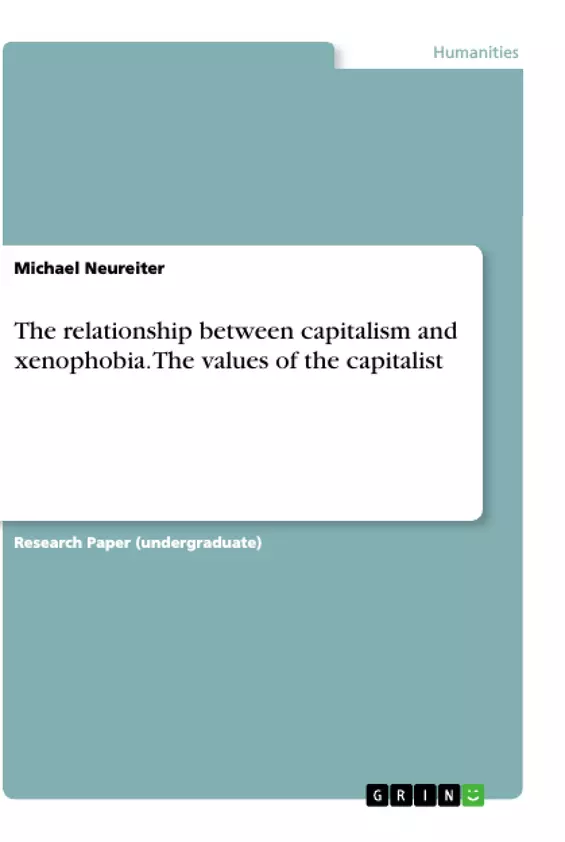This study deals with the question: do capitalist values increase or decrease xenophobia?
There has been much scholarly debate about the impact of capitalism on xenophobia. While it is widely accepted that capitalist economies create values which then in turn influence xenophobic attitudes, this debate is in large part not settled yet. As previous studies on the subject have failed at providing comprehensive conceptualizations of and quantitative evidence on capitalist culture and values.
To address this gap in the literature, the latest wave of the World Value Survey will be used to inductively develop a set of capitalist values from individuals’ responses to questions on economic issues. Through this inductive approach, four distinct values associated with capitalism will be identified: materialism, economic individualism, a belief in small government, and a capitalist work ethic.
Then, OLS will be used to assess the relationship between these four values and individuals’ attitudes toward immigrants as well as people of different race and religion. It is found that materialism and capitalist work ethic increase hostility toward people different from oneself, whereas economic individualism decreases it.
Belief in small government does not have a statistically significant impact on xenophobia. These findings have important implications for both the scholarly debate on the effects of capitalist culture and the public discussion about economic reform.
Inhaltsverzeichnis (Table of Contents)
- Abstract
- Aim and Scope
- Capitalism and Xenophobia: The Literature
- Capitalist Values and Xenophobia: An Empirical Analysis
- Data and Methods
- Results
- Discussion
- Conclusion
- References
Zielsetzung und Themenschwerpunkte (Objectives and Key Themes)
This study investigates the relationship between capitalism and xenophobia, examining how capitalist values influence individuals' attitudes toward immigrants and people of different races and religions. It aims to provide empirical evidence to address the debate surrounding this complex issue and its implications for both academic discourse and public policy.
- The impact of capitalism on xenophobia.
- The role of capitalist values in shaping attitudes toward immigrants and minorities.
- The identification and measurement of specific capitalist values.
- The relationship between capitalist values and xenophobic attitudes.
- The implications of these findings for understanding the effects of capitalist culture and economic reform.
Zusammenfassung der Kapitel (Chapter Summaries)
- Abstract: This section provides a brief overview of the study's objectives, methodology, and key findings. It highlights the debate on the relationship between capitalism and xenophobia and the need for comprehensive conceptualizations and quantitative evidence.
- Aim and Scope: This chapter sets the context for the study by discussing the prevalence of Chinese immigrants in Southeast Asia and the patterns of anti-Chinese violence. It introduces the concept of economic nationalism and its impact on individuals' attitudes toward immigrants. The chapter further outlines the competing perspectives on the relationship between capitalism and xenophobia.
- Capitalism and Xenophobia: The Literature: This chapter provides a detailed review of the existing literature on the relationship between capitalism and xenophobia. It explores various theoretical perspectives, including criticisms of capitalism and its potential connection to xenophobia, and analyzes the Disintegration Theory developed by the Bielefeld School.
- Capitalist Values and Xenophobia: An Empirical Analysis: This chapter introduces the study's research design and methodology. It explains the use of the World Value Survey data to inductively develop a set of capitalist values and outlines the measures used to evaluate the relationship between these values and xenophobic attitudes.
- Data and Methods: This chapter details the data used in the study, describing the World Value Survey and the specific questions used to assess capitalist values and xenophobic attitudes. It also explains the statistical methods employed in the analysis, including factor analysis and OLS regression.
- Results: This chapter presents the key findings of the study. It reveals the relationship between specific capitalist values and individuals' attitudes toward immigrants and people of different races and religions.
Schlüsselwörter (Keywords)
This study focuses on the interrelationship between capitalism and xenophobia. It examines key capitalist values such as materialism, economic individualism, belief in small government, and capitalist work ethic, and explores their connection to individual attitudes toward immigrants and minorities. Furthermore, the study investigates the broader implications of these findings for understanding the dynamics of economic systems and social divisions.
- Arbeit zitieren
- Michael Neureiter (Autor:in), 2014, The relationship between capitalism and xenophobia. The values of the capitalist, München, GRIN Verlag, https://www.grin.com/document/962221



